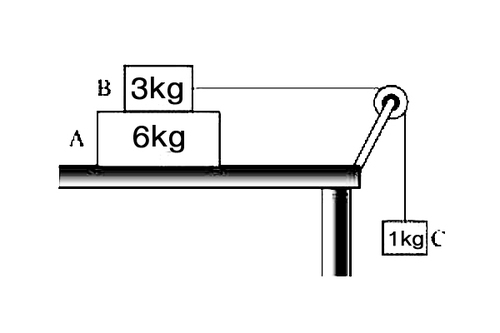Friction

In the diagram, object weighing is on a frictionless desk. Object weighing is sits atop moving together with it due to friction. Object weighing is connected with object by a pulley.
Which of the following statements is correct?
The magnitude of the force with which the string is pulling object
is
N.
The direction of the friction force upon object
is the same as the direction of motion of object
The magnitude of the friction force upon object
is
N.
Gravitational acceleration is
This section requires Javascript.
You are seeing this because something didn't load right. We suggest you, (a) try
refreshing the page, (b) enabling javascript if it is disabled on your browser and,
finally, (c)
loading the
non-javascript version of this page
. We're sorry about the hassle.
Considering A and B as a single mass of 9 kg we can form two equations in a(acceleration) and T (tension in string). These would be 10-T=a and T=9a which gives T=9 N so first statement is correct. For the second statement we should consider the fact that the rope is pulling object B and not A therefore friction must be towards the left which is opposite in direction to A's motion which is moving towards right with a=1 ms^-2. For the third statement we have to consider only object B and the forces acting on it which are the pull from the rope and the frictional force. The net force produces the acceleration of 1 ms^-2 towards right so the equation would be 9-f=3a where f is the frictional force. This gives f=6. Hence a and c are right. Cheers.